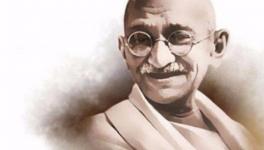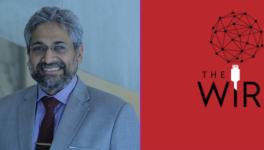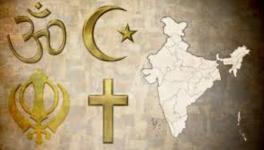Journalism Today, and What it was in Nehru’s Time
Even as a wide amalgam of conservatives, Far Right lobbies and their allies train their guns as never before on Jawaharlal Nehru’s 17 years as Prime Minister of Independent India, his role in the country’s freedom struggle and the struggle of a global Non-Aligned Movement, what stands out today are several thoughtful writings of Nehru, his letters to chief ministers, his regular press conferences, and, of course, his thoughts on freedom of the press and journalists’ rights.
Nehru’s role in caring for journalists’ rights and freedoms, perhaps even more than the problems press barons of that era, is noteworthy. It is more noteworthy today when journalists’ rights and freedoms, especially their right to livelihood, is being trampled upon like never before -- by contracts of bondage and selective press bashings in an undeclared emergency situation. Even as hundreds of journalists and co-workers are on the roads, sham acknowledgements of recognising them as ‘COVID warriors’ notwithstanding, the media community, perhaps, has never had it so bad.
Born in this new era, are also black labour codes that seek to end labour struggles for rights, including the Working Journalists Act and, of course, the current Majithia Wage Board Award that remains, by and large, unimplemented. In fact, the Working Journalists Act and wage boards are seeing slow death, without no alternative structure emerging. In fact, using COVID as an excuse, there has been mass retrenchment in phases, targeting those under the wage board and most senior journalists, along with those seen as ‘critical’.
Simultaneously, journalists’ right to cover Parliament has been reduced to a virtual lottery and national news agencies, such as Press Trust of India (PTI)and United News of India (UNI), along with their language counterparts, are being squeezed of funds. Many journalists and co-employees of UNI are on the roads, a few are languishing with virtually no salary and a questionable provident fund. Today, the very concept of an autonomous corporation like Prasar Bharati has been slaughtered and being replaced, churning out programmes like Mann Ki Baat or Prime Minister Narendra Modi’s speeches to nation or establishment reporting.
Bureaucrat and diplomat Late PN Haksar, as a close follower yet critic of Nehru, had said years ago while delivering a Sarojini Naidu Memorial Lecture that: “Despite his many failures, Nehru’s humanism, his deep concern about promoting scientific temper in our society, his dedication to secularism and his upholding of the values of democracy in our country are of continuing relevance. Our ancient society can never modernize itself unless we work out in detail the imperatives dictated by scientific temper, by the processes of secularization and of democracy. These imperatives would include not merely economic development but, even importantly, the fundamental transformation of our value system of our thinking processes and of our social structure.”
In fact, the concept of a scientific temper, which was born as a result of the various reports of the Press Commissions, is seeing no follow up. Furthermore, there has been no Press Commission after the first two. What is needed today is a Media Commission set up by an Act of Parliament, to cover the wide spectrum of the industry.
The era of Nehru’s monthly historic press conferences is clearly over with Modi having said goodbye to these, preferring a monologue like Mann Ki Baat and rare press briefings to a select few.
That to some extent Nehru enjoyed being lampooned in cartoons is very clear in his words to one of the most famous cartoonists in India of his time K Shankar Pillai. At the inauguration of Shankar’s cartoon exhibition, Nehru famously said: “Don’t spare me Shankar”, and indeed Shanker did not spare him. What followed is an interesting book of some 1,500 cartoons of Jawaharlal Nehru, most of them in Shankar’s Weekly. This compilation is made from nearly 400 cartoons from the magazine.
Set in chronological order, the cartoons depict the ‘Nehru Era’ as Shankar saw unfold itself in the first phase of his rule.
Nehru as a Journalist
Indeed, Nehru began his earlier career as a journalist. In fact, he was a crusader, campaigning for the freedom struggle as a Congress leader. Later, though many of his books became best-sellers, he did not claim to be a writer. Writing to him was a part of self-expression as a man of action, and at his best, he gave it a literary touch and some rhythm. In his writings it is often said his journalism consists largely of the capacity to react and express that reaction quickly and effectively.
Nehru, like Gandhi, was a great journalist of those times. In fact, he was a journalist-cum-activist fighting for India’s freedom. Later, Nehru took keen interest in the press because he felt that it had a role to play in national life after Independence and also in support of a policy of Non-Alignment amid struggles of the developing world. Both during the freedom struggle and after freedom, Nehru had deep respect for the place the press occupies in national life.
To him, freedom of the press was a part of the democratic process and he accepted his own criticism even if it was strong. He often not only tolerated criticism but appreciated it. What upset him were malice, lack of dignity, or ignorance of history. But, overall he upheld the principle of a free press even when he did not often respect sections of the press for not being up to the high standards that he expected of them.
As one of his admirers, the National Herald editor M Chalapathi Rau said in his book on Nehru: “For him freedom of the press consisted essentially of editorial freedom and not of freedom of the owner of the press. He disliked press barons of all kinds and post-war developments in the Indian press oppressed him so much that he took interest in the appointment of the Press Commission.”
Nehru was fully aware of the role of a newspaper proprietor and the conflict that occurs with the exercise of press freedom. Therefore, addressing the All India Newspaper Editors’ Conference on September 17, 1952, he felt that “the money, the owner and the proprietor are major factors. Does the freedom of the Press ultimately mean the freedom of the rich man to do what he likes with his money through the Press?... So it may be that the freedom of the writer to write what he will but rather of the owner of a newspaper to see that the writer writes something that he wants him to write…Therefore, the freedom of the Press may come to mean the freedom of persons who have knack of making money.” (The Democratic Journalist -- The Journalist in Nehru by M R Dua)
Nehru told the Press institute of India in a seminar in 1963 that “there is the question of monopoly in journalism. That is not an Indian question merely. In England gradually the so-called independent newspapers are disappearing. A few great national dailies are eating up everything else. One or two major proprietors are themselves buying up all the other journals. Whether that is good or bad is for you to judge but naturally the real freedom of thinking and expression of thought is limited by it. It is not Government only that limits it but other facts. If one person owns all the major newspapers, well, naturally he will see to it that his views are expressed and contrary views are not expressed in a way that he dislikes.”
Nowadays, of course, there is a tendency among editors to fade out of the picture. He is an unknown individual, nobody quite knows who he is, what he is like. In the olden days, an editor was known as an individual, as a person. He had a certain individuality in every sentence of his writing. Now anonymity is creeping in.
Even as a politician, Nehru would not be far removed from journalists. In fact, he himself equated one with the other on one occasion by saying rather candidly: “Politicians and journalists have much in common. Both presume to talk too much, to write too much, to deliver homilies; both, generally speaking, require no qualifications at all for their job.” Needless to say, his sermons to newspaper owners indeed do suggest that he would have castigated newspaper owners for what is now known as the ‘paid news’ syndrome, or advertorials appearing as editorials.
In his book, Chalapathi Rau, a leader of the undivided journalist movement, said Nehru indeed did take Interest in practical problems of the press, particularly of journalists. He noted: “After the fierce debates, mainly between press lords and the Home Minister, on the amendments to article 19 of the Constitution in 1951, Jawaharlal Nehru started taking a practical interest in problems of the press. There was talk of an inquiry into what was the basis of freedom of the press, whose freedom it was, and how that freedom was exercised, and whenever I saw him in those days, mainly in his house, I saw on his table a copy of the report of the Royal Commission on the Press. He was studying it closely, and he took great interest in the appointment of the Indian Press Commission (The First Press Commission). …”
Respect for Press freedom
As has been observed by Rau, Nehru as a congress leader, journalist and freedom fighter, had high professional standards and sought them in the daily or weekly operation of press freedom. “He always advised us to refer to the British authorities debatable news items, with disputable facts, coming from Congress sources. Would not the British or any other authorities deny facts that went against them? It did not matter, he said; they should be given their chance. If they gave their version, it should be also published. This was even in the old days. The soundness of his advice was proved when for a one-sided version, emanating from Congress sources and carelessly edited and published, the editor had to go to jail for criminal libel. Should the editor apologise? The directors were fumbling and the editor did not know what to do. From prison, Jawaharlal Nehru sent instructions that the case must be fought, and if the editor was sentenced, it was all right; it would do him good. The flag was never to be lowered, and so we lived dangerously, from day to day, till the British authorities swooped on us one day. Turned us out, and put the offices under lock and key”, said Rau.
When one thinks of the sedition law today as it is being used to muzzle voices, it would not be difficult to stress that Nehru would have opposed many such measures, including recent measures where press persons complained of Parliament passes being selectively given for coverage of the Winter session. Notably, a few days ago a senior journalist resigned from the Media Advisory Committee of the Rajya Sabha in protest. Recently, Delhi’s Press Club of India on the very last day of the Winter session, organized a seminar on ‘The Reciprocal Relations Between Parliament and Media’, where senior Congress leader Mallikarjun Kharge, in his message, even raised the issue of media being denied entry. This is what he said: ‘Media is the fourth pillar of democracy. It is through the press that vital information about parliamentary debates reaches people. It is the Parliament’s role to make laws and to discuss issues that matter to common people. Government does not want Parliament to function. The suspension of 12 Rajya Sabha MPs is testament to this. It also objects to the media giving voice to opposition. With this mindset, not just the media, but all pillars of democracy are under threat.”
It is known, that Nehru, too, was quite unused to having journalists demonstrating vocally and marching on the roads to meet him. But this is how he reacted to perhaps the first such demonstration that he faced. In 1957, the proprietors of The Hindu, Madras, sacked their legal correspondent in Delhi, M.K. Ramamurthi, for his trade union activity. So incensed were journalists that they took a decision to march to Nehru’s house. At a hurriedly called meeting, a letter was sent to Nehru stating that journalists would come to his house the following morning, hoping to be received by him.
Here is a field report by B R Vats, one of the founders of the journalist movement: “It was a great achievement, indeed, for middle class people with all their prejudices and inhibitions of their class taking resort to a procession in the street to protest against injustice. Nehru was annoyed with the letter. But when the procession reached his house, he did call a delegation of five. The present writer was a member of this delegation. Nehru told us, “So you served notice on me last night that you would march to my house and I must receive you.”
We told him that it was not a notice but the situation had arisen so suddenly that the rank and file of the Delhi Union of Journalists demanded that a procession be taken out immediately to Nehru’s house.”
Nehru described the action of The Hindu proprietors in sacking Ramamurthi as “badtameezi” (ill-mannered). It implied that this was not a civilised way of dealing with employee-employer relations. He even agreed to the demand for the Press Commission to look into their grievances and it was indeed formed and was an eye opener for its times. It was formed by an Act of Parliament and included experts, such as not only journalists but jurists and parliamentarians too.
Also, take the case of United Press of India, a nationalist news agency of the times, facing grim possibilities of closure. Unions like the Indian Federation of Working Journalists then and the Delhi Union of Journalists (DUJ) were supporting the journalists. In this case, Nehru did intervene, but in vain. A touch of McCarthyism prevailed. Pandit GB Pant called UPI a ‘den of communists ‘. Congress leader Morarji Desai told a delegation of UPI employees: “Do you want me to open a relief kitchen for you?” The delegation walked out in protest. Gradually, UPI was finished.
Ironically this chapter is forgotten. Here was an agency that played a glorious role in the freedom struggle. In fact, many leaders, from Mahatma Gandhi, Jawaharlal Nehru, Khan Abdul Ghaffar Khan down to Jagjivan Ram and Jainarayan Vyas, were some of its honorary correspondents. And indeed, at that time the British owned Associated Press of India was blacking out speeches of India’s freedom fighters.
Doesn’t all this ring a bell today? See what is happening to employees of, say, UNI today, especially the journalists and their wages. See the salary sheets of the new managers and the wages due to hundreds of employees. UNI even now is known to have perhaps the best network by way of a Urdu service. We have seen failed attempts by an Indian Rupert Murdoch to take it over and run it successfully. Attempts were made to substitute it with the Rashtriya Swayamsevak Sangh’s Hindustan Samachar. It has a centrally-located building, and offices all over the country in prime locations, but their journalists are on the roads, some even living in starvation-like conditions, or on half their salaries. One after another, unions are being crushed or cajoled.
Postscript
It is well known that Nehru was in touch with artistes, writers, philosophers and well-known personalities from all over the world besides, of course, our Indian national movement leaders as well as international personalities, such as philosopher Bertrand Russell, author Leo Tolstoy, scientist Albert Einstein among others. He indeed was a man of letters. Many wrote to him with utmost frankness. Here is a letter to Nehru from eminent playwright George Bernard Shaw from way back in September 1948. (The letter speaks for itself).
“Dear Mr. Nehru,
I was greatly gratified to learn that you were acquainted with my political writings; and I need hardly add that I should be honoured by a visit from you, though I cannot pretend that it will be worth your while to spend an afternoon of your precious time making the journey to this remote village, where there is nothing left of Bernard Shaw but a doddering old skeleton who should have died years ago.
I once spent a week in Bombay, another in Ceylon; and that is all I know at first hand about India. I was convinced that Ceylon is the cradle of the human race because everybody there looks an original. All other nations are obviously mass products.
Though I know nothing about India except what is in the newspaper I can consider it objectively because I am not English but Irish, and have lived through the long struggle for liberation from English rule, and the partition of the country into Eire and Northern Ireland, the Western Equivalent of Hindustan and Pakistan. I am as much a foreigner in England as you were in Cambridge.
I am wondering whether the death of Jinnah will prevent you from coming to England. If he has no competent successor you will have to govern the whole Peninsula.
Faithfully,
George Bernard Shaw
The writer, a veteran journalist, is president, Delhi Union of Journalists. The views expressed are personal.
Get the latest reports & analysis with people's perspective on Protests, movements & deep analytical videos, discussions of the current affairs in your Telegram app. Subscribe to NewsClick's Telegram channel & get Real-Time updates on stories, as they get published on our website.























